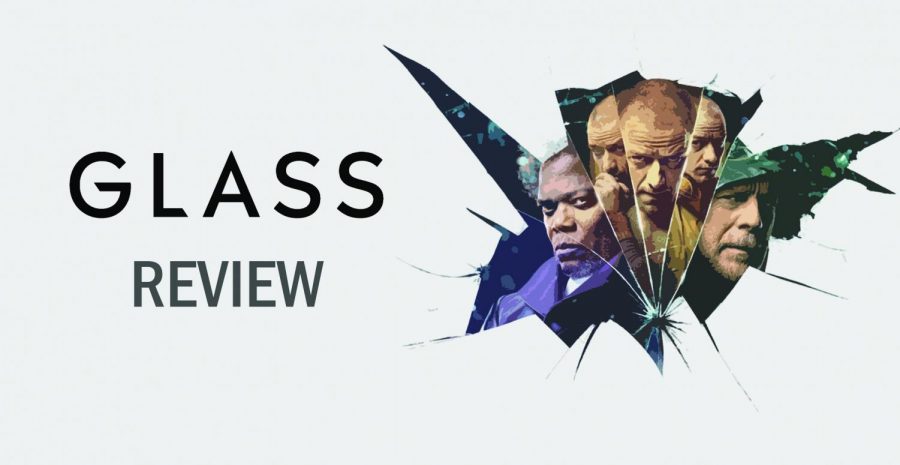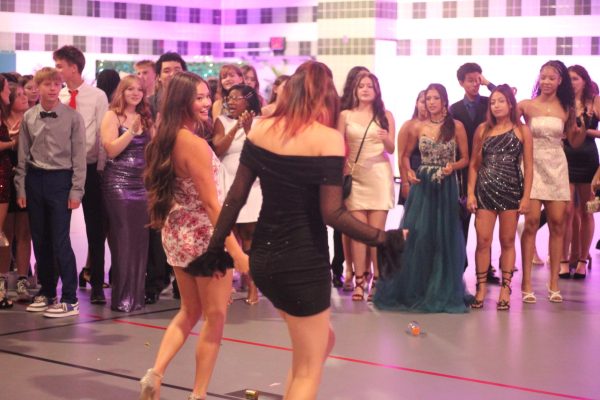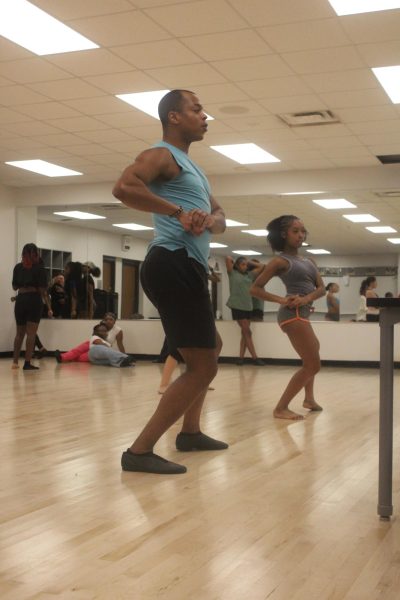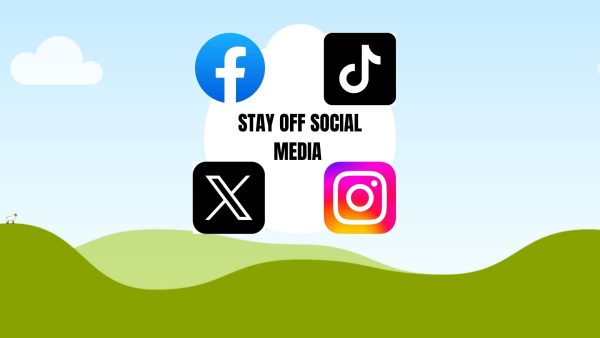Glass Review
M. Night Shyamalan’s new film manages to “Split” audience’s “Unbreakable” expectations.
One of the most interesting things about M. Night Shyamalan’s 2017 thriller film “Split,” other than the fact that it was an actually good movie to come out from M. Night Shyamalan after 2001, was the classic M. Night twist ending. Where, after hearing a news report on the events of the film, a random patron of a local diner is reminded of a similar case wherein a crazed wheelchair-bound terrorist was incarcerated after masterminding a series of terrorist bombings, including a rather grisly bombing on a Philadelphian train line. This customer is then affirmed by a stranger that the person they were thinking of was a man by the name of Mr. Glass, and that the stranger telling them this was none other than Bruce Willis in an uncredited cameo as David Dunn from Shyamalan’s previous 2000 film “Unbreakable.”
In that film, Dunn was an ordinary man who found that he could perform a host of supernatural powers: immense physical strength, heightened durability to bodily harm and the ability to see someone’s deepest darkest secret just by giving them a cursory brush on the shoulder. Dunn later teams up with comic book aficionado, Elijah Price (Samuel L. Jackson) — affectionately nicknamed Mr.Glass for his unnaturally fragile bones — before he was later arrested for what the diner patron remembered, commiting a grimm train bombing that left Dunn as the unscathed sole survivor, kickstarting the rest of the film.
Nineteen years later, Dunn now finds himself in “Split,” a movie focusing on a psychotic kidnapper with dissociative identity disorder by the name of Kevin Wendell Crumb, nicknamed “the Horde” and played by James McAvoy. The movie chronicles the events that a young teenage girl named Casey (Anya Taylor-Joy) goes through to escape the clutches of Kevin and his most carnivorous and violent persona, “the Beast.”
What Dunn’s appearance at the end of “Split” meant was that the film was actually a kind of secret sequel to “Unbreakable,” despite the fact that it’d never been mentioned in the film or any advertising that the two films existed in the same cinematic universe until that final scene.
Naturally, this revelation set fans into a fervor, and Shyamalan announced three month’s after “Split’s” release that he’d be turning this crossover into a trilogy with a new film named “Glass.”
With expectations now on the line, Shyamalan would not only have to tie both films into a cohesive and engaging narrative, but do so while also mixing the film’s two wildly different tones. This task would prove challenging for even the most skilled director, and it’s sad to report that Shyamalan just isn’t quite up to the task.
There’s a truly engaging and ambitious film buried somewhere within “Glass,” the only issue is that the film spends too long meandering about trying to find it.
It’s hard to talk about the plot to a Shyamalan film without delving too much into spoiler territory, but to give a very basic plot synopsis of the film: 19 years after the events of “Unbreakable” and a mere three weeks after the events of “Split,” David, Kevin and Elijah all find themselves institutionalized in a mental asylum under the watchful eye of Dr. Ellie Stapler (Sarah Paulson), a psychiatrist who specializes in the very niche field of breaking patients who live under the delusion that they are real life superheroes. What ensues is a painfully slow story that fails to deliver on the potential of its admittedly cool sounding concept.
“Unbreakable” was a slow, muted and realistic depiction of the superhero genre. It excelled in showing the inner struggle of David Dunn as he comes to terms with his newfound abilities while attempting to maintain a solid relationship with his family. “Split” was a kinetic and freaky film that served as Shyamalan’s brief return to grace. The film was bolstered by some solid narrative pacing, but more importantly by its performance by James McAvoy, giving it all in an Oscar-worthy performance, that makes you believe that there may be 24 people rattling around in his head. “Glass” fails to pick up either of its successor’s good parts, and instead lands straight in the middle of mediocre. The film is full of phoned-in acting, Bruce Willis now acts more like an empty husk who’d rather be anywhere else, and James McAvoy now acts like he confuses the word “nuance” with trying to shove in as many goofy accents on screen as possible. At least Samuel L. Jackson’s performance is still essentially the same, however his dramatic rambling monologues on the nature of how we perceive comic books seemed a lot less hokey in the year 2000, when they predated the existence of the Marvel Cinematic Universe.
There are some genuinely nice things to say about “Glass.” The film’s attempt at tying together its various unrelated stories and characters perhaps doesn’t rival the likes of “Infinity War,” but it is impressive nonetheless. And seeing Bruce Willis and Samuel L. Jackson reprise their roles as hero and villain 19 years later is a nice blast from the past, no matter how stilted their performances may be. The film has a nice collection of some rather pretty looking shots with a good sense of composition and color, and when McAvoy isn’t yucking it up to the camera, his performance is as captivating as ever. However, the problem is that however many positives there may be, they are simply buried under the weight of how dull the surrounding movie is. The plot is full of nitpicks and character logic that simply doesn’t add up. The inclusion of the previous film’s side characters simply bogs down the plot and adds even more bored performances. And despite being the ending to a trilogy that no one expected or asked for, the ending of “Glass” falls positively flat. Not to be outdone, but the patented Shyamalan twist ending this time around was one of the worst in his career. It’s one of those endings that the more you think about, the more it retroactively ruins the entire rest of the film, coming so out-of-left-field it almost seems like it was awkwardly cut from the film with how little foreshadowing it gives. What’s left is an ending so dumb that it gives “the trees are making us kill ourselves” and “the aliens are allergic to water” a run for their money. Shyamalan tries just enough to keep the film from falling into “The Happening” levels of awful, but it doesn’t stop itself from being a clunky, sloppy story that kept my interest only half the time, and that was with me actively being a fan of the series so far. Shyamalan really does try here, but despite being a sequel about the villain from “Unbreakable,” “Glass” has more in common with “Split,” as it too seems to have a case of Dissociative Identity Disorder, split between multiple films and tones, and unsure of what it’s trying to be. If you’ve already seen and enjoyed the “un-split-able” duo of films and you’re curious to see how they all tie together, then there are probably worse ways to spend your time. However, if you find “Glass” to be your first and only entry into M. Night’s wacky cinematic universe, then do yourself a favor and just go and watch “The Sixth Sense” instead. At least you can actually see that twist coming.










